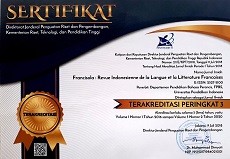Language politeness in French
Abstract
RÉSUMÉ. La politesse linguistique fait partie d'une attitude qui contient la valeur de la politesse dans les interactions quotidiennes. La politesse se reflète toujours au niveau du discours (langue). Il convient d'y prêter attention dans le cadre de l'apprentissage du français afin d'aider les apprenants d'une deuxième langue et de leur permettre de l'utiliser dans la communication. L'objet de cette recherche est la forme de discours utilisée dans la communication via WhatsApp (WA) par les étudiants avec les professeurs en fonction du contexte de la politesse linguistique. La collecte des données a été effectuée à l'aide de techniques d'observation, c'est-à-dire en lisant attentivement les énoncés contenant des formules de politesse de l'étudiant dans la conversation WA du professeur. L'analyse des données a été effectuée dès le début, les chercheurs ont recueilli des données en utilisant le modèle proposé par Ricœur, à savoir avec une compréhension sémantique, réflexive et existentielle. Les résultats ont montré qu'en représentant la politesse dans le langage, les étudiants ont utilisé diverses expressions telles que (a) les salutations, (b) les excuses, (c) les regrets, (d) se présenter avant de transmettre leur signification. En outre, il existe également des discours qui réduisent la politesse des étudiants à l'oral, tels que : commencer une conversation sans utiliser les salutations et se présenter. Par conséquent, la compétence en matière socioculturelle de la langue française doit être maîtrisée par l'apprenant (les étudiants) afin de pouvoir utiliser le français appris de manière appropriée et polie.
Mots-clés : apprenants, français, langue, politesse
ABSTRACT. Language politeness is part of an attitude that contains the value of politeness in everyday interactions. Politeness will always be reflected in the level of speech (language). This needs to get attention in learning French as an effort to help second language learners, so they can use it in communication. The object of this research is the form of speech used in communication via WhatsApp by students to lecturers according to the context of language politeness. Data collection was carried out using observation techniques, namely by reading carefully the utterances containing student language politeness contained in the lecturer's WA. Data analysis was carried out from the beginning, the researchers collected data using the model proposed by Ricoeur, namely with semantic, reflective, and existential understanding. The results showed that in representing politeness in language, students used various utterances such as (a) greetings, (b) apologies, (c) regrets, (d) introducing themselves before conveying their meaning. In addition, there are also speeches that reduce the politeness of students in speaking, such as: starting a conversation without using greetings and introducing themselves. Therefore, competence in matters relating to the socio-cultural of the French language must be mastered by the learner (students) in order to be able to use the learned French appropriately and politely.
Keywords: french, language, learners, politeness
Full Text:
PDFReferences
Pramujiono, A. et al, (2020). Kesan tunan Berbahasa, Pendidikan Karater, dan Pembelajaran yang Humanis. Jakarta: Telaga Ilmu
Brown, P., Levinson, S.C. (1987). Politeness Some Universals in Language Usage. New York: Cambridge University Press
Grainger, K., Mills, S. (2016). Introduction: Language, Culture, (Im)politeness and (In)directness. In: Directness and Indirectness Across Cultures. Palgrave Macmillan, London. 1-33 https://doi.org/10.1057/9781137340399_1
Grice, H. P. (1989). Studies in the way of words. Cambridge: Harvard University Press
Gunarwan, A. (2008). Pragmatik: Teori dan Kajian Nusantara. Jakarta: Universitas Atma Jaya
Hall, C. (2010). Politeness in Europe. Journal of Pragmatics. https://doi.org/10.1016/j.pragma.2009.12.002
Leech, G. (2014). The Pragmatics of Politeness. In The Pragmatics of Politeness.https://doi.org/10.1093
Leech,G. (2015). Prinsip-Prinsip Pragma tik. Jakarta: Universitas Indonesia
Li, E. S. H. (2010). Making suggestions: A contrastive study of young Hong Kong and Australian students Journal of Pragmatics,42,598-616. http://dx.doi.org/10.1016/ j.pragma. 2009.07.014.
Maryam F. (2018). Politeness Strategies in Remindings A Cross-cultural Study of Iranian EFL learners and Americans. Journal of Intercultural Communication, (46) 1-20 ISSN 1404-1634 https:// www.researchgate.net/publication/324312651
Obana, Y. (2011). Politeness in Japan. In Politeness in East Asia. https:// doi.org/10.1017/CBO9780511977886.009
Okamoto, S. (2010). Politeness in east Asia. In Interpersonal Pragmatics. https://doi.org/10.1515/9783110214338.1.71
Oktavianus. (2006). Analisis Wacana Lintas Bahasa. Padang: Andalas University Press.
Pan, Y. (2011). Politeness in China. In Politeness in East Asia. https://doi org/10.1017/CBO9780511977886.008
Pranowo. (2009). Berbahasa secara Santun. Yogyakarta: Pustaka Pelajar.
Rahardi, R. K.. (2010). Pragmatik Kesantuan Imperatif Bahasa Indonesia. Jakarta : Erlangga
Seken, I K. (2011). Some Notes on Linguistic Politness and Its Relation to Second Language Teaching. Lingua Scientia. 18 (1) 39-87. ISSN :0854 – 9125 DOI: http://dx.doi.org/ 10. 23887 /ls.v18i1.16038
Sirimangkala, P. (2013). Book Review: Politeness in East Asia. Journal of language and Psychology https://doi.org/10.1177/0261927x13479784
Tian, X. and Zhao, H. (2006). Specificity of politeness contrastive study of western and chinese concepts of politeness. Sino-US English Teaching, 3 (2), ISSN 1539-8072
Wijana, I. D. (1996). Dasar - Dasar
Pragmatik. Yogyakarta: Andi Offset.
Yang, S. C., & Liu, S. F. (2004). Case study of online workshop for the professional development of teachers. Computers in Human Behavior, 20(6), 733-761
Yule, G. (2006). Pragmatik (Edisi Terjemahan Oleh Indah Fajar Wahyuni Dan Rombe Mudtajab). Yogyakarta: Pustaka Pelajar. Yule, George. 2006. Pragmatik (Edisi Terjemahan Oleh Indah Fajar Wahyuni Dan Rombe Mudtajab). Yogyakarta: Pustaka Pelajar.
Zamzani, T. M, Siti M, Ari. L, Yayuk E.R. (2012). Pengembangan Alat Ukur Kesantunan Bahasa Indonesia dalam Interaksi Sosial Formal Bersemuka. Jurnal Penelitian Humaniora. 17 (2), 92-117, ISSN 1412 - 4009, 2528 – 6722 DOI: https:// doi.org/ 10 .21 831 /hum.v17i2.3102
Zuchdi, D. (1993). Panduan Penelitian Analisis Konten. Yogyakarta: Lembaga Penelitian IKIP Yogyakarta.
DOI: https://doi.org/10.17509/francisola.v8i1.60895
Refbacks
- There are currently no refbacks.
Copyright (c) 2023 FRANCISOLA

This work is licensed under a Creative Commons Attribution-ShareAlike 4.0 International License.
View My Stats











